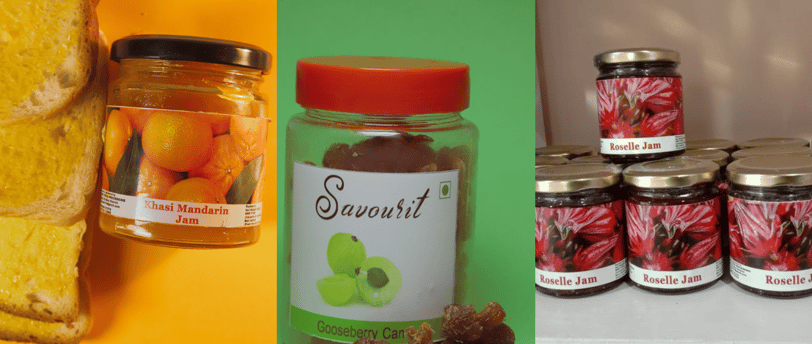Startup Rynsan Creation dehydrates fruits and increases their shelf life
Known by the brand name, Savourit, people can now relish the taste of fruits even during the off-season.
FOOD SCIENCE AND TECHNOLOGY


By Raymond Lyngdoh
Hailing from a farming-class family, I always wanted to do something on my own and contribute to society through my service; the breakthrough came in 2018 while I was working on a government project in Ri Bhoi District.
After completing my MSW or master's in social work from Don Bosco Arts and Science College, under Kannur University in Kerala, I started working on different projects, and the last one was a government project to gain knowledge and experience. My exposure and experience during that period in the project that focused on rural development enabled me to expand my thought process while also supporting the farmers, especially the pineapple farmers, ginger farmers, and others, in improving their livelihood by providing capacity building, market access, financial access along with technological support.
My colleagues and I made lots of effort to train and support the farmers in marketing their farm produce, especially horticulture crops such as pineapples, ginger, and spices available in abundance in the district, using the various facilities within the project provision. My wife, Mebari Nongrum, and I even went to the extent of undertaking product development independently to show the farmers that by value addition, they can prevent post-harvest loss and, at the same time, increase shelf life. We were trying to enable them to generate better income through sales of value-added products. But in the end, that did not work out. Hence, seeing the opportunity in the sector, we decided to take up the business ourselves.
In the initial stage, we did a lot of research with trial and error to find the best method for value addition of the horticulture crops, especially fruits with higher moisture content. The first product that we experimented with was the pineapple. After lots of brainstorming, we ended up with the idea of dehydration using the hybrid solar dehydrator. The dehydrator works on solar power as well as with electricity. The logic was that it is affordable, and the fluctuation of electricity in the region would have less impact on the processing procedure. In addition to this, we have many other advantages in using the dehydration technique.
At a later stage, we undertook the product development of almost all indigenous fruits and spices available in the district. Most of them came out very successfully.
We worked on dehydrating pineapples and other local indigenous fruits to increase the products' shelf life and reach better. We did not know anybody who had done that kind of value addition we were trying to do, especially in the dehydration sector.
Incubation and funding
We first showcased our dehydrated fruits in an exhibition in February 2019 under the brand name Savourit. The crowd was huge, and the appreciation was beyond expectation. That motivated us to establish a brand and work harder to improve our technology and products. That was the seed for starting the startup Rynsan Creation Pvt. Ltd.
Next, we participated and showcased our products regularly in many exhibitions. It was purely our initiative that we researched how to work on the dehydration of pineapples and other indigenous fruits with the core value of helping the farmers reduce post-harvest loss, which later developed into a business model. We studied various options of value addition to these fruits available in the country and the world and tried to adapt and customize contextually.
Meanwhile, we also got the opportunity to incubate our startup with the PRIME (Promotion and Incubation of Market Driven Enterprises) program of the government of Meghalaya in collaboration with Indian Institute of Management Calcutta Innovation Park (IIM CIP). Here they supported us with mentoring as well as with financial support.
We were the first batch; we had to undergo a process of pitching. IIM CIP Kolkata was the knowledge partner. So we were among the top 25 for our idea and got some financial support; we got the award of Rs 1,00,000. After that, we got incubation with them for the next nine months.
Next, we applied for a loan of Rs. 25 lakhs from Livecome, under MBMA or Meghalaya Basin Management Authority, at 0 percent interest.
Solar dehydrators
It was not easy; we realized we needed a constant power supply for dehydrating the fruits, which was turning out to be expensive. The power supply in the state is erratic and constantly fluctuating.
We felt it was better to dehydrate using the solar dehydrator because that would be cheaper. It can be used even when electricity fluctuates.
I researched those entities that are using solar dehydrators across the globe; how do solar dehydrators work? How do they function? We were also planning to design our customized solar dehydrators. Initially, it was very tough, but gradually, we could work on it.
The Challenges
We started the work informally in 2018 and could finally register the company in February 2021. We could have worked on the startup faster, but for COVID-19, when for a year, work was stalled.
Then there were delays in various compliances and permissions, such as the clearance from the pollution control board was also an issue we had to run from pillar to post, and after that, the 3-phase power connection from MePDCL (the electricity board in Shillong) took its own sweet time.
Today, we are delighted we could construct the new unit. It consists of the proper processing unit with several machinery that would enable us to increase the production capacity and ensure quality control.
Now that everything is in place (except for the power connection, which is still pending but will hopefully be done by February 2024), we look forward to expanding our work and team. We dehydrate pineapples, wild gooseberry, ginger, wild apples, strawberries, plums, peaches, bananas, mulberry, and other local indigenous fruits during seasons. We also make jams from most of these indigenous fruits, including pineapple jam, blackberry jam, mulberry jam, plum jam, orange jam,
We sell our products through various retail outlets within the state, while for those outside the state, it is mainly based on orders. We also manufacture for those interested in labeling our products.
